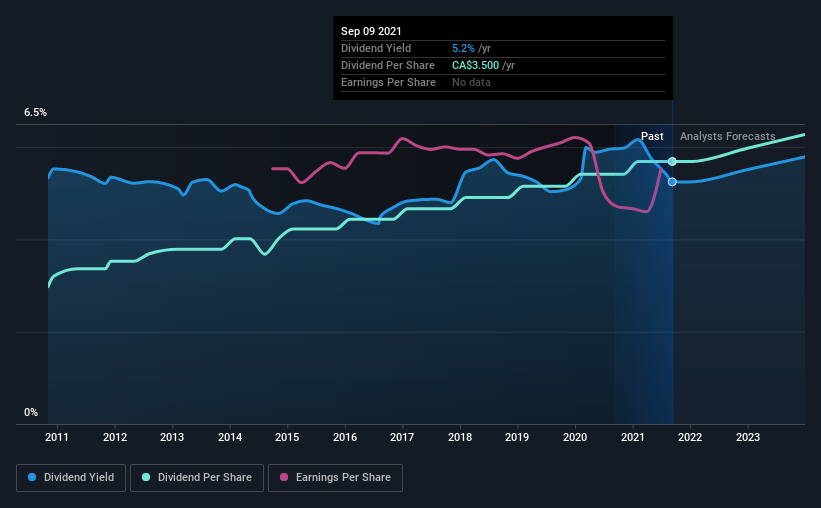We Wouldn't Be Too Quick To Buy BCE Inc. (TSE:BCE) Before It Goes Ex-Dividend
BCE Inc. (TSE:BCE) is about to trade ex-dividend in the next 3 days. Typically, the ex-dividend date is one business day before the record date which is the date on which a company determines the shareholders eligible to receive a dividend. The ex-dividend date is an important date to be aware of as any purchase of the stock made on or after this date might mean a late settlement that doesn't show on the record date. Therefore, if you purchase BCE's shares on or after the 14th of September, you won't be eligible to receive the dividend, when it is paid on the 15th of October.
The company's next dividend payment will be CA$0.88 per share. Last year, in total, the company distributed CA$3.50 to shareholders. Based on the last year's worth of payments, BCE has a trailing yield of 5.2% on the current stock price of CA$66.71. Dividends are a major contributor to investment returns for long term holders, but only if the dividend continues to be paid. So we need to investigate whether BCE can afford its dividend, and if the dividend could grow.
See our latest analysis for BCE
Dividends are usually paid out of company profits, so if a company pays out more than it earned then its dividend is usually at greater risk of being cut. BCE paid out 115% of profit in the past year, which we think is typically not sustainable unless there are mitigating characteristics such as unusually strong cash flow or a large cash balance. Yet cash flows are even more important than profits for assessing a dividend, so we need to see if the company generated enough cash to pay its distribution. It paid out 93% of its free cash flow in the form of dividends last year, which is outside the comfort zone for most businesses. Cash flows are usually much more volatile than earnings, so this could be a temporary effect - but we'd generally want look more closely here.
As BCE's dividend was not well covered by either earnings or cash flow, we would be concerned that this dividend could be at risk over the long term.
Click here to see the company's payout ratio, plus analyst estimates of its future dividends.
Have Earnings And Dividends Been Growing?
Stocks with flat earnings can still be attractive dividend payers, but it is important to be more conservative with your approach and demand a greater margin for safety when it comes to dividend sustainability. Investors love dividends, so if earnings fall and the dividend is reduced, expect a stock to be sold off heavily at the same time. That explains why we're not overly excited about BCE's flat earnings over the past five years. We'd take that over an earnings decline any day, but in the long run, the best dividend stocks all grow their earnings per share.
The main way most investors will assess a company's dividend prospects is by checking the historical rate of dividend growth. Since the start of our data, 10 years ago, BCE has lifted its dividend by approximately 6.7% a year on average.
The Bottom Line
Has BCE got what it takes to maintain its dividend payments? It's been unable to generate earnings growth, yet is paying out an uncomfortably high percentage of both its profits (115%) and cash flow (93%) as dividends. Overall it doesn't look like the most suitable dividend stock for a long-term buy and hold investor.
Although, if you're still interested in BCE and want to know more, you'll find it very useful to know what risks this stock faces. For example, we've found 3 warning signs for BCE (1 is a bit unpleasant!) that deserve your attention before investing in the shares.
We wouldn't recommend just buying the first dividend stock you see, though. Here's a list of interesting dividend stocks with a greater than 2% yield and an upcoming dividend.
This article by Simply Wall St is general in nature. We provide commentary based on historical data and analyst forecasts only using an unbiased methodology and our articles are not intended to be financial advice. It does not constitute a recommendation to buy or sell any stock, and does not take account of your objectives, or your financial situation. We aim to bring you long-term focused analysis driven by fundamental data. Note that our analysis may not factor in the latest price-sensitive company announcements or qualitative material. Simply Wall St has no position in any stocks mentioned.
Have feedback on this article? Concerned about the content? Get in touch with us directly. Alternatively, email editorial-team (at) simplywallst.com.

